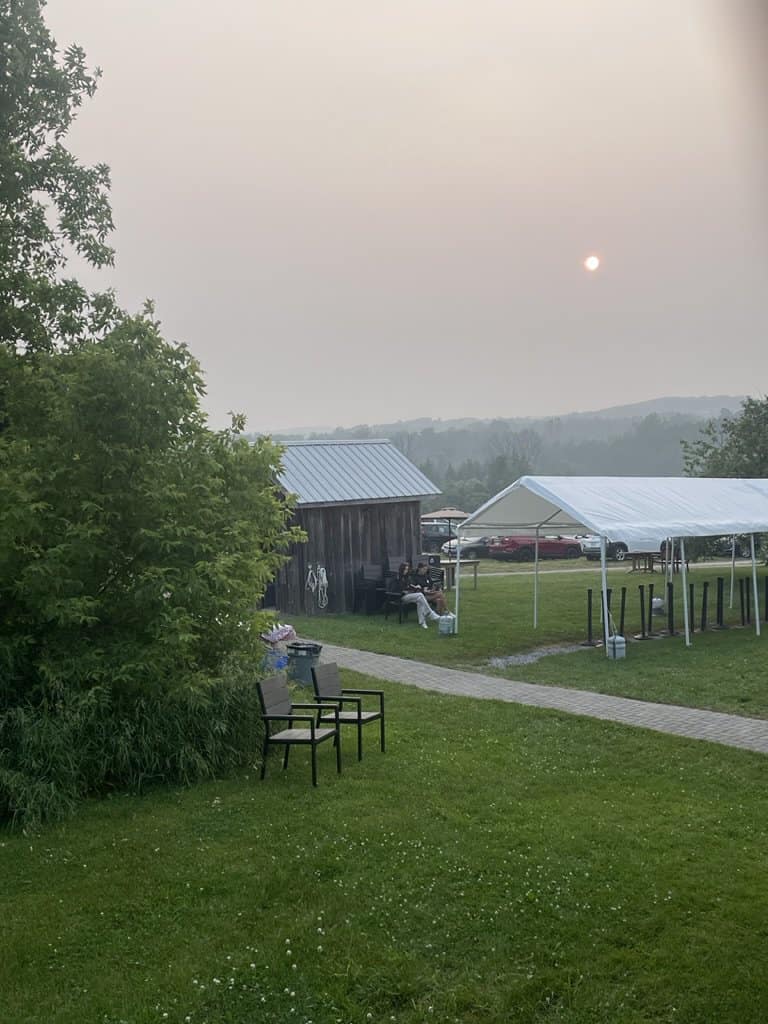Big change begins with small talk
Peterborough Examiner – June 16, 2023 – by Drew Monkman
As a dystopian orange sun rose over the Kawarthas last week and Peterborough recorded the second worst air quality in all of North America, one thing became abundantly clear: the impact of climate change has descended upon us in full force. No longer can we comfort ourselves in thinking that this crisis is something far away in space and time. The choking smoke changed all that. Even worse, this was simply a dress rehearsal for more climate chaos to come. And it’s all because of our addiction to fossil fuels.
Driven by hot, dry conditions most likely linked to global heating, fires across Canada had already burned about 4.7 million hectares of forest as of June 12. This is at least 10 times more than “normal” for this early in the fire season and is equivalent to an expanse five times the size of the Greater Toronto Area. Canada is now on track for its worst wildfire season ever.
The more we learn about the health impacts of the toxin-laced smoke, the scarier all of this becomes. Around the world, air pollution is already responsible for as many as 10 million deaths per year. The smoke doesn’t only exacerbate respiratory and coronary conditions, but it’s potentially linked to certain cancers. At the very least, it makes us feel awful and ruins other plans as we’re stuck inside with windows closed.
The wildfires and smoke shouldn’t come as a surprise. Just last month, carbon dioxide in Earth’s atmosphere hit 424 parts per million (ppm), a new record in human history. Not only are CO2 levels still rising, but the rate of increase is accelerating.
While events such as worsening wildfires are what the science says will occur more often under climate change, we still have to be cautious. A scientific attribution study will be necessary to ascertain the exact role of global heating in these fires.

Solastalgia
There is a name for the distressing emotions that many of us are experiencing right now: solastalgia. It’s a combination of the Latin word “solacium” (comfort) and the Greek root “algia” (pain, suffering). Solastalgia therefore describes the sense of heartbreak and anxiety when the home we know and love – in our case, Peterborough and the Kawarthas – is assaulted by environmental change like the recent smoke. Gone is the sense of safety that one’s home should provide. And few things feel less safe than not being able to breathe the air around you. Solastalgia also describes feeling homesick even though you haven’t gone anywhere. It’s as if the home we know, love and feel deeply connected to is leaving us.
The derecho windstorm from a year ago also caused deep solastalgia in many people as backyards, parks and even entire landscapes were ripped apart. I feel solastalgia, too, when I see the countless dead ash trees, the diminishing bird numbers, the plethora of invasive species, and winters so mild they’re barely recognizable.
But let’s remember that these kinds of feelings are completely normal. What’s not normal or healthy is to turn a blind eye to the destruction of the planet and to carry on as if everything is fine. However, by talking with others about painful climate-related emotions, we quickly realize we’re not alone in feeling this way. And painful emotions don’t have to be debilitating. They can move us to take action. They can also help us to come together in a community of like-minded people. We will need collective strength more than ever to cope with and adapt to a more hostile environment.
How to talk about it
As distressing as the smoke has been, it provides a huge opportunity to talk about the severity of the climate crisis. By doing so, you can hopefully raise the awareness level of friends and family. You might also discover that they feel as concerned as you.
When people ask you how you’re doing, don’t just reply with a perfunctory “Fine” but be honest. You might say something like, “Not great. I just can’t help but think about the recent smoke and how quickly climate change is happening.” If you’re a parent or grandparent, you could add, “I really fear for my kids’ and grandchildren’s future. And maybe even my own.” I try to do this at every opportunity, sometimes even with strangers at the grocery checkout counter. By expressing how you feel, you send the message that it’s both safe and absolutely necessary to talk about this “elephant in the room” topic.
When you have these conversations or just a very brief chat, focus on emotions and shared values – anywhere you can find common ground. This can include wanting a promising future for our kids, to be better prepared for more extreme weather events, to have clean air to breathe, to have a stable climate for economic and job security, and to assure a healthy future for nature and wildlife.
Don’t dwell on personal lifestyle changes but insist on much more aggressive government action. Share your concerns on social media, too. Just don’t make the other person feel threatened or waste time engaging with climate deniers, now only a tiny part of the population.
Yes, you might get pushback or an attempt to minimize the problem. Your interlocutor may say something like, “You shouldn’t worry yourself about climate change. The climate’s always changing, and we’ve always had forest fires. It’s really not a big deal.” The best way to respond is to simply say, “I know you’re trying to make me feel better, but this is how I feel. I don’t know all the facts, but I do know that 99% of scientists accept the science of climate change. I believe them. If they were wrong about the fundamentals, we’d know it by now.”
If the conversation only lasts a minute or two, that’s fine. At least you’ve planted a seed. If you should end up having a lengthier exchange, you might want to add that governments will only act if we put pressure on them and that they follow public sentiment more than shape it.
Why conversations work
According to Canadian climate scientist and climate communicator Katharine Hayhoe, talking about climate change is one of the most important individual action that anyone can take. People trust their peers, friends, and family members more than they trust experts, scientists and environmental organizations. This has never been truer than right now. You can talk to people about climate change in ways that the experts can’t. You are therefore far more likely to open people’s minds.
By initiating these conversations, it raises the chances that others will become more concerned or simply feel validated if they already feel the same way as you. It’s likely that they, too, will begin talking to their own circle of friends and family. This can have a snowball effect. The goal, of course, is that these conversations will help to raise climate change concern to levels that politicians can’t ignore. Sadly, we aren’t there yet.
I recommend listening to Hayhoe’s Ted Talk entitled, “The most important thing you can do to fight climate change: talk about it.” You will find it at https://tinyurl.com/2vd4ad5a The David Suzuki Foundation also has a wonderful resource called “How and why to have climate change conversations”. Go to https://tinyurl.com/7td5wkre
The future we choose
Clearly, there aren’t yet enough of us speaking out or even enough of us who really understand how dire the situation has become. Politicians like Ontario Premier Doug Ford and federal Conservative leader Pierre Poilievre can therefore get away with almost never mentioning climate change or having credible policies to deal with it. In question period last week, Ford even refused to link the wildfires to global heating.
The choices we are making today, including whether or not we normalize talking about climate change, will help to determine our collective future. Will it be a future with a manageable level of warming or one of runaway climate chaos? We are certainly well on the way to the latter. Canada is already on fire at the current 1.1 C of warming and the world is on track to breach 1.5 C within the next five years. Remaining silent on this existential crisis is literally killing us.
Finally,Peterborough’s For Our Grandchildren is one of the oldest and most active volunteer-based climate action groups in Canada. Go to https://forourgrandchildren.ca/ to subscribe to the newsletter and to find ways to take further action. Please consider joining.
